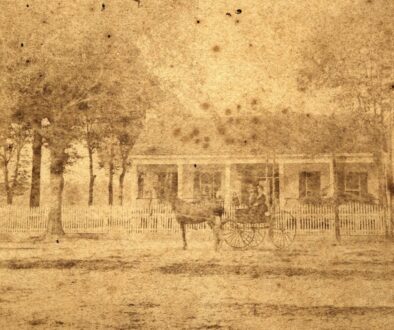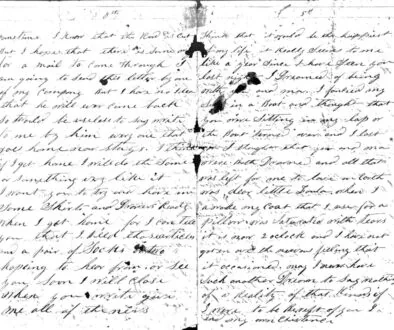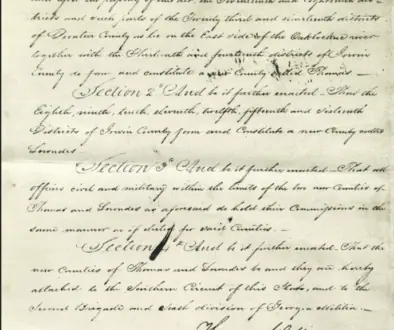Problems with Peter: The Peter Dekle Letters
Here at the History Center, we like to supply our collections department interns and volunteers with interesting projects that illustrate what life in Thomas County’s past was like for her citizens. We have many letters, records, diaries, and documents that give sneak peeks into the daily lives of people who were more like us than we may realize.
One of our interns, Kayla Reeves (who recently attained her bachelor’s degree in history from Florida State University), was tasked with transcribing a collection of letters from Private Peter Dekle (1836-1863) to his wife Susan Dunbar Dekle (1839-?) of Thomasville. Peter’s letters span from April of 1862 to August of 1863 when he served in the Confederate Army in Company F of the 29th Infantry. For most of his military service, Peter was stationed around Savannah but was later sent to North Carolina and Mississippi before he was wounded at the Battle of Chickamauga. After several months, he succumbed to his injuries; however, the whereabouts of Susan following her husband’s death are currently unknown.
Here’s what Kayla had to say about Peter and his letters to Susan:
“As a drafted soldier, Peter did not generally discuss ideological reasons behind the war in his letters, rarely mentioning secession or even regional animosity. However, Peter’s letters provide valuable insight into the experiences and mentality of an average soldier, demonstrating themes of homesickness, despair, adventure, and adjusting to the general monotony of camp life.”
In this blog series, Kayla explores some of these themes with excerpts from Peter’s letters. Please keep in mind that Peter was writing in the language and attitudes of his time which we now consider to be racist and prejudice.
Conscription (the Draft)
As a drafted soldier, Peter discussed his feelings about conscription in several of his letters. While Peter generally expressed displeasure with being drafted, in his early letters he often emphasized a sense of duty and responsibility. However, as his service continued, he began expressing more negative sentiments about having been drafted.
In his letter from May 16, 1862, Peter expresses the frequency of men trying to dodge the draft and be disqualified from service, stating:
“I expect I never saw as many men have as much excuses in all my life to get out of the Conscript law. They get a certificate but they are mistaken. I am not afraid to bet all I am worth that they are Conscripted in less than a month. I am not render any excus[e]. If I do, it will not do me any good. I will be asshoim [ashamed] to go home and then cared [for] like a negro is to get out of service. It will not pay to do so. I am a going to stay till I cant stand it then get a discharge honerably and when I get that I will be safe” [1980.04.02].
In this passage, Peter asserted his commitment to serving out his time in the Confederate military. However, throughout his letters, he never states any intention to volunteer for military service if not drafted and does not express significant sentiments for or against Southern secession. Notably, this is also one of the few times in his letters that Peter mentions Black people as a group. While obviously expressing negative sentiments toward enslaved populations, Peter does not elaborate on the topic.
One of Peter’s main complaints about the draft is that it has taken him away from his wife and infant child and has prevented him from managing his affairs at home. In one letter from July 16, 1862, Peter was very upset that people had apparently stolen a significant amount of produce from his family farm while he was away. After angrily stating that he cannot believe those at home would allow this injustice, Peter notes,
“I wish Conscript will take the last man in the whole state and they will no [know] how we pore fellows feel when we here [hear] that our property are going to nothing and cant help our selfs. I am one of the most miserable men now living and no way to remedy it” [1980.04.04].
Being so far from home, Peter felt helpless while hearing about the issues his family faced at home. Many of his letters contain directions to his wife about running the farm and dealing with business matters followed by his frustration that he cannot be there to assist with these matters. Like many in an unfair situation, Peter wished to even the playing field with his fellow Southern men who were more fortunate not to be drafted.
Peter’s feelings about the Confederate Government’s policies remain ambiguous throughout his letters home; however, he lamented his conscription throughout the war. Peter’s misery over being forced away from home and his jealousy of those who dodged the draft conflicted with his sense of honor and duty toward a job well done. Despite his frustrations with his situation, Peter remained determined to complete his service in a way he could feel proud of at the end of the day.
But that doesn’t mean he couldn’t gripe about it along the way.




